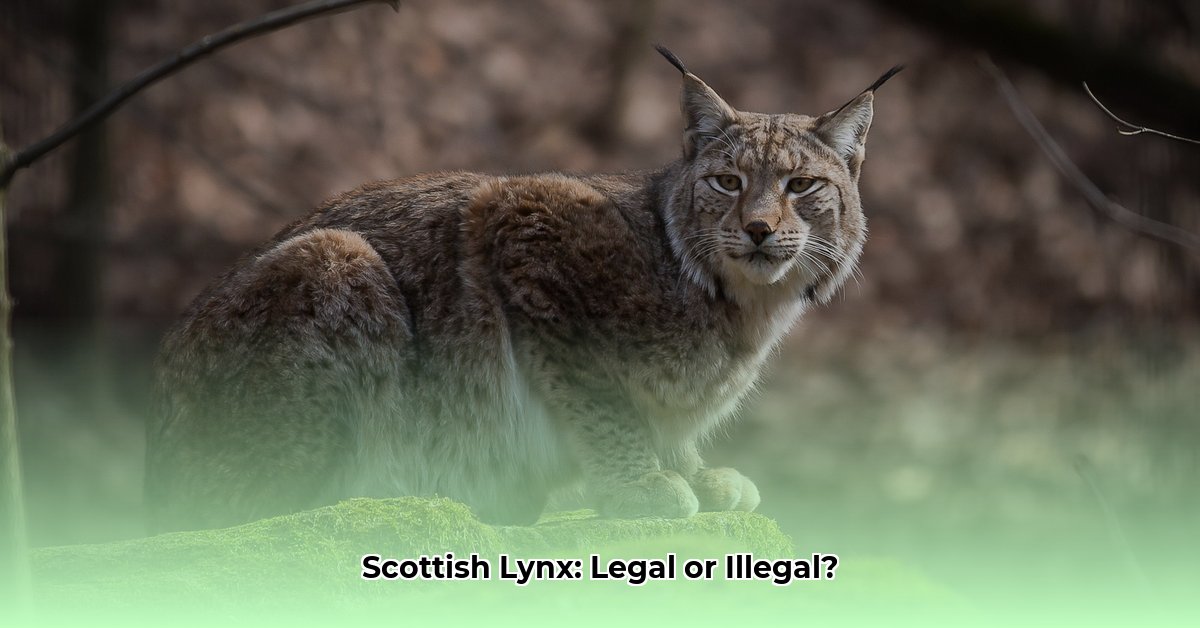Summary: It is illegal to own a lynx in Scotland without a license under the Dangerous Wild Animals Act 1976. Licenses for lynx are extremely rare and unlikely to be granted for private ownership.
The Legality of Lynx Ownership
The Dangerous Wild Animals Act 1976 prohibits private ownership of a lynx in Scotland without a license. This legislation aims to protect public safety, ensure animal welfare, and preserve Scotland’s natural environment. A lynx, a wild predator with specialized needs, is not suited to a domestic setting. Their natural behaviors, including hunting and territoriality, pose potential risks in residential areas. Furthermore, the Act recognizes the difficulty of providing adequate care for a lynx in captivity. Their complex dietary and environmental requirements are challenging to replicate outside of their natural habitat.
Obtaining a License: A Daunting Task
While a licensing process technically exists, it is exceptionally demanding and rarely results in private ownership. Applicants must demonstrate expert knowledge of lynx care, provide a secure and enriching habitat that meets stringent standards, and commit to the animal’s long-term welfare. This typically involves significant financial investment and ongoing dedication. Licenses are primarily granted to established zoos and wildlife sanctuaries with the resources and expertise to meet these rigorous demands. For the average person, obtaining a license is highly improbable.
Lynx Sightings: Illuminating the Issue
Recent reported lynx sightings in the Scottish Highlands raise important questions. While some sightings might be misidentified, others probably suggest illegal releases. These unauthorized introductions not only violate the law but also jeopardize the animals and undermine legitimate rewilding efforts. Released lynx, often lacking the skills to survive in the wild, may face starvation, disease, or conflict with existing wildlife. These incidents underscore the importance of adhering to legal channels for reintroduction, such as the Lynx to Scotland project.
Rewilding: A Responsible Path Forward
The Lynx to Scotland project advocates for the controlled reintroduction of lynx to the Scottish Highlands. This science-led initiative emphasizes a careful, phased approach, involving extensive research, habitat assessments, community engagement, and ongoing monitoring. The goal is to restore a missing piece of Scotland’s ecological puzzle, not to endorse private ownership. Rewilding efforts recognize the vital role lynx can play in regulating deer populations and promoting biodiversity. However, the project also acknowledges the complex debate surrounding reintroduction, including concerns about potential impacts on livestock and other wildlife. Ongoing research and open dialogue are crucial for navigating these complexities and ensuring a responsible approach.
Penalties for Illegal Ownership
The penalties for illegally owning a lynx are severe. They include substantial fines, confiscation of the animal, and potentially euthanasia. These measures reflect the seriousness of the offense and aim to deter illegal activity, protect public safety, and promote animal welfare.
FAQs: Addressing Common Queries
What other wild animals are illegal to own in Scotland?
The Dangerous Wild Animals Act 1976 covers a wide range of species, including wolves, bears, certain primates, and venomous snakes. It’s crucial to research the legal status of any animal before considering ownership. The Scottish Government website provides resources on wildlife legislation.
What is the latest on lynx reintroduction efforts in Scotland?
The Lynx to Scotland project continues to conduct research and engage with stakeholders. They advocate for a scientifically informed approach to reintroduction, prioritizing ecological balance and responsible wildlife management. Up-to-date information can be found on the Lynx to Scotland website.
Who do I contact if I see a lynx?
Report any suspected lynx sightings to Police Scotland or the Scottish SPCA. Your prompt action can help ensure public safety and facilitate appropriate responses.
Ongoing Research and the Future of Lynx
The scientific understanding of lynx behavior, ecology, and the potential impact of reintroduction continues to evolve. Ongoing research may influence future regulations and management strategies. It is likely that the future of lynx in Scotland will continue to be a subject of discussion, research, and careful consideration.
Disclaimer: This information is for educational purposes and does not constitute legal advice. Consult with relevant authorities for the most up-to-date regulations.







